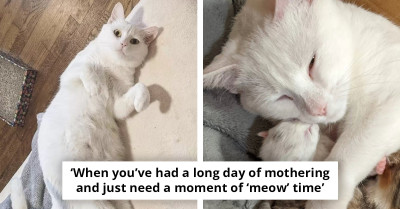
Horrified Florida Residents Find Giant Alligator in Kitchen After Hurricane Milton Floods Their Home
Florida residents return to find their homes taken over by displaced wildlife—gators, snakes, and more...

The aftermath of Hurricane Milton has brought more than just structural damage to Florida residents; it's causing a wave of wildlife displacement that’s proving both dangerous and unsettling. As floodwaters engulf neighborhoods, animals like alligators, snakes, and even bears are being forced from their natural habitats into human spaces.
In one viral TikTok video, a family returning to their flooded home is greeted by a massive alligator prowling through their kitchen. As the gator bares its teeth, one shocked family member can be heard exclaiming, “Holy sh*t!”—which is definitely an understandable reaction to finding a wild predator inside their home.
Hurricanes like Milton often lead to significant flooding and environmental disruption. These storms generate intense rainfall, storm surges, and wind speeds that can exceed 157 mph in Category 5 hurricanes, displacing wildlife and devastating ecosystems.
Florida, known for its wetlands and diverse wildlife, is especially vulnerable, with animals like alligators and snakes easily swept into populated areas. The chaotic conditions can cause animals to seek higher ground, leading to encounters with humans in places like homes and urban areas.
This is a growing concern, adding an extra layer of danger for residents returning to assess damage in the wake of the storm.
Hurricane Milton: The Aftermath and Animal Displacement
Hurricane Milton has ravaged parts of Florida, leaving thousands of homes flooded and families displaced. While many residents evacuated as advised, some are returning to find their homes occupied by wild animals.
The Florida Fish and Wildlife Conservation Commission (FWC) has warned that alligators, snakes, bears, and even manatees are likely to be displaced by the excessive floodwaters and high winds. These animals, seeking refuge from the rising waters, are finding their way into neighborhoods and homes, much to the alarm of returning residents.
Biologist Christopher Gillette, known for his expertise with reptiles, has been actively issuing warnings to people in the affected areas.
In a post shared on his Instagram, Gillette urged residents to avoid floodwaters, not only to prevent encounters with displaced wildlife but also due to the presence of human sewage in the waters.
"Watch for snakes and gators in the floodwaters, stay safe and stay out of the water!" he wrote, adding that alligators are able to hold their breath underwater for up to six hours, making them particularly dangerous in flood conditions where visibility is low.
The Growing Risk of Wildlife in Urban Areas
The situation is growing increasingly hazardous as displaced animals take refuge in urban areas. Gillette, who runs the Bellowing Acres Sanctuary, further explained that while his sanctuary’s gators were relatively safe, the widespread displacement of other animals like snakes is a serious concern.
"There will be many displaced animals that people have to watch out for, including snakes on the ground," Gillette told PEOPLE. "They can be easy to miss when they're among all of the fallen branches on the ground. People need to be really careful navigating areas in the aftermath."
In the wake of Hurricane Milton, it's not just the physical damage that poses a threat to the affected areas. The presence of displaced wildlife, including venomous snakes and aggressive alligators, adds a new layer of danger for those trying to navigate flooded neighborhoods or return to their homes.
 Photo by Pixabay from Pexels
Photo by Pixabay from PexelsStay Vigilant and Safe
As rescue operations continue and floodwaters begin to recede, residents are urged to be cautious when re-entering their homes. The FWC continues to remind everyone to steer clear of unfamiliar water, especially in the aftermath of such a large-scale natural disaster.
From gators in kitchens to snakes hiding in debris, Hurricane Milton has left Florida with more than just rebuilding to worry about—there's also the challenge of safely managing displaced wildlife.
Sophia







